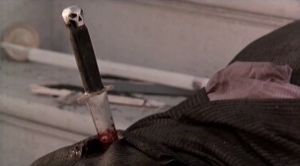
Like Ghost Rider before him, the Punisher is one of those breakout characters from early ’70s that seemed dark and edgy in his time, only to be surpassed by any given action movie hero on any given weekend of any given summer. Vengeful murder became a novelty in American comic books after the Moral Panic of the mid-1950s sanitized everything. The 60s and 70s were sad times, and they produced some sad sack characters, but at least the wave began to roll back towards a grim, more gruesomely violent place. That’s something, right? Sure as hell makes things more marketable.
But since I don’t do what so many do and confuse marketable levels of violence for “realism” I’ve never been able to take the Punisher all that seriously. He would’ve been yet another one-off Spider-Man villain in an age that already overflowed with them, were it not for the fact he shared Parker’s tendency to monologue like a Spalding Gray robot and constantly question the merit of his own actions…even as he murders bad guys by the mansion-full. The contrast can be hilarious, depending on how overwrought the prose turns out, and so obvious even Marvel’s realized it on occasion.
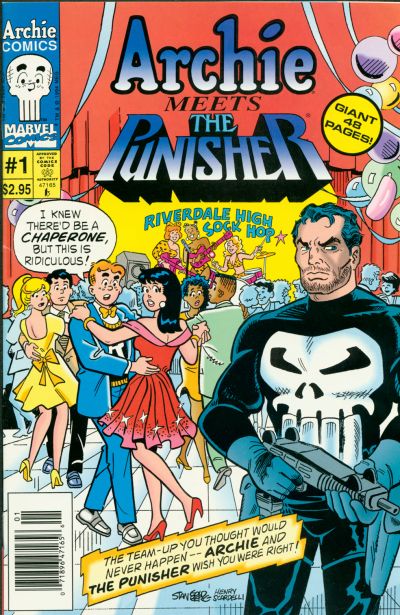
I’ve never been a real fan and I’d like to apologize to any over-serious Punisher fans in advance, because I’m about to make a series of occasionally-cruel jokes at your beloved Frank Castle’s expense. I don’t hate him – to me he’s a staple of the Marvel Universe. But I’ve never really gotten into him or his breed of nihilistic “realism.”
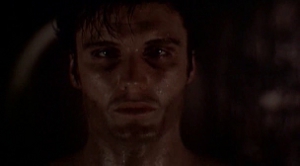
The Punisher is, in the Terminator’s argot, “the man most directly responsible” for the anti-hero explosion of the 80s and 90s. Comic book fans label this “the Dark Age of American Comic books” for only semi-ironic reasons. In an effort to mass produce the Punisher’s popularity, comic book companies swelled their ranks with murderous thugs in ammo belts, toting increasingly over-sized chips (and pads) on their shoulders.
None of which is the Punisher’s fault, really. As a fictional character, he’s blameless for things that occur outside his universe. But by that same token, he’s a carbon copy of Paul Benjamin from Death Wish – the “normal” man who takes the law into his own hands after the law’s apparent failure to protect his so-called “normal” life. I’m not saying Gerry Conway had the book (yes, Death Wish was a book first) in his lap while drafting the Punisher’s origins…all I’m saying is, I wouldn’t be surprised if that were true.
Frank Castle began life as an ex-Marine with a family killed by the mob for taking a walk through Central Park at the wrong time and witnessing a gangland murder. This led Frank to declare a one-man War on Crime that inevitably brought him into conflict with the other vigilantes of his home universe. For whatever reason (the most popular being “because the script says so”) even the most stringent moralists in Marvel’s ranks continue to let Frank walk around murdering criminals in relative peace. Because that’s the kind of casual hypocrisy that goes on in a world without Batman.
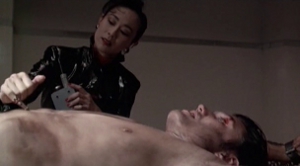
(As opposed to the casual hypocrisy that goes on in a world with Batman, which we won’t go into here. It’s too goddamned depressing.)
As such, you’d think the Punisher would’ve fit right into the movie landscape of the 1980s, especially after the explosion of comic book-related films that followed Superman. The great thing about the Punisher is, his ability to monologue through the medium of word boxes or thought bubbles allows him to look like the Platonic Ideal of Taciturn Badassery in almost every panel. Since film is a visual medium, all our perspective filmmakers had to do was make a movie about the Punisher shooting people and looking cool…right? Right.
And it would’ve worked, too…if Marvel Comics hadn’t fallen on such hard financial times during the 1980s. So desperate were they to get their properties in the public eye, they even sold themselves out to New World Pictures…which was in itself on the financial ropes all throughout this movie’s production. It still might’ve been a knock-down, hardcore superhero/actionsploitation picture…if they’d hired anyone else to direct it. Or been able to afford a decent leading man. But sometimes everything goes wrong at once.
What’s worse, Our Anti-hero’s played by a Dolph Lundgren so dedicated to underplaying his role I expected him to drop dead from exhaustion at any moment. His Frank Castle is a perpetually baggie-eyed, sewer dwelling sociopath, five years and one hundred and twenty-five confirmed kills into his War on Crime as the movie opens. (And one year away from being tossed out of his sewer den by a foursome of giant turtles and their giant rat sensei. ) This Punisher is a former [Insert City Here] police detective, mourning the family he lost to a mafia carbomb, even as he tried desperately to pull them from the flames. Everyone in Genericville PD just assumes Frank died in the explosion, and why not? We never see how he survives.
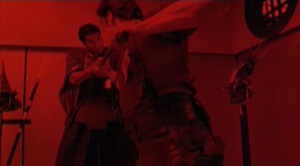
Doesn’t matter, because this (like the Batman movie that was, even as this movie wrapped, superseding it in popularity) is not an origin story. And I’ll give it props for actually being a decent Punisher adventure. Boaz Yakin’s script is not content with being a ninety minute gunfight and explosion fest. There genuinely is an idea working away inside this movie’s head. It’s just hard to see it through the doll-like, dead-eyed stare of our titular star.
The idea’s one of escalation, which Bat-films wouldn’t take on for another sixteen years. Thanks to Frank’s actions, the city’s native mobs are weak enough for the Yakuza to mark them for assimilation. Led by the sinister Lady Tanaka (Kim Miyori), the stereotypical Japanese mob kidnaps the stereotypical Italian-American mob’s grade school-aged children. With the Punisher blamed for these kidnappings and the Yakuza closing in, Our Anti-hero must unite with mob boss Gianni Franco (Jeroen Krabbé) – the very same mob boss who ordered the bomb attached to Frank’s family station wagon – and Save the Children before they’re sold into white slavery. (Jesus, how Yellow Peril can we get?) Along the way, the Punisher must dodge the forces of everyday law and order, led by his former partner, Jake Berkowitz (Louis Gossett, Jr.) and Jake’s new partner, Sam Leary (Nancy Everhard).
All of which sounds exciting, and there’s plenty of excitement to go around. For an American action movie of this vintage, The Punisher is admirably brutal. Not quite brutal enough to satisfy my casual understanding of its main character’s methods, but what can you do? At this point, the Slasher film was still going strong (as far as anyone could tell), and there’s an air of classical Slasher villainy around the Punisher. He never kills two people the same way if he can avoid it. Sure, he guns down rooms full of ’em at a time, but once that’s done he’s happy to drag things out in good ol’ fashioned Mortal Kombat. In this the filmmakers got Frank Castle absolutely right – he is exactly this kind of vigilante sociopath. Cold, calculating, ruthless…but weirdly obsessed with honor in the same vague, inarticulate way as some extraterrestrial cultures I could name.
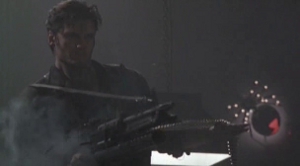
This distinguishes Frank Castle from his horde of imitators, and I’m glad the film chose to be about that, or at least used that as a display rack for its gunplay and explosion scenes. Otherwise, they might’ve wound up looking even more like Rambo II than they do already. There’s a particularly familiar scene early on, where Our Anti-hero shoots up an underground casino with his belt-fed monster gun while turning in a circle and screaming. At least Frank has the presence of mind to not waste bullets by firing randomly into the sky. (And where does a supposedly-dead ex-cop get access to surplus military hardware anyway? Where the hell is this, Detroit?)
Nor does he forget the fun and intimacy inherent in a good edged weapon. In fact, the hilts of his apparently custom-crafted knives (crafted by whom?) bear the only skull emblems in this damn movie. You might be tempted to dismiss any discussion of that skull’s absence as a meaningless fanboy gripe, but hear me out. I think it’s symptomatic of this movie’s bigger issue. It’s not an outright-bad film, and it gets better as it goes along. The ending is gut-wrenching in all of the best possible ways. But the movie takes a long way to get there, and its detours through some 80s Action territory that was already well-traveled even before Rambo II became the genre’s public face.
I’ve watched this movie multiple times and every time, without fail, the first hour and change evaporates from my mind even as the credits roll. That’s too bad because all of Louis Gossett Jr.’s best stuff is in that first hour, where he turns in a great performance as a wonderfully conflicted character. The conflicts of Jake Burkowitz (a Cop Who Doesn’t Play By the Rules attempting to save his best friend, who’s making up his own rules) are painfully visible on that normally-hardassed Louis Gossett Jr. face. It’s too bad his name isn’t in the title, or he might’ve got to join in the action and contribute something worthwhile…rather than fill the role reserved for a thankfully-not-here Love Interest and get kidnapped during the Third Act.
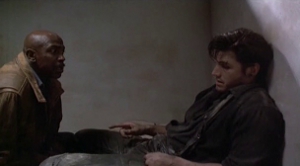
Jake’s attempt to capture the Punisher starts off as the third strand of our ongoing plot thread (the other two being Frank’s War on Crime and the mob’s war with the Yakuza). By the end of the second act, the Punisher delivers himself into police custody. So Jake’s story is basically over at this point, and the movie knows it, so Gianni Franco springs Frank and we get into the Climactic Action. Louis Gossett Jr.’s left twisting in the breeze until the very end, and I can’t condone that in any film, regardless of how many creative kill scenes it throws at me.
Seems this movie cast its biggest actors in its least-interesting roles. Gossett is basically wasted (his being the least Action-heavy plot thread). Dolph looks like he’s auditioning for Nic Cage’s part in Leaving Las Vegas and he mumbles every line like a man speaking through the haze of some high-grade heroin. But despite being saddled with your typical scumbag antagonist character, Jeroen Krabbé manages to convey some real depth. Not only is his Gianni Franco smart enough to realize there’s no dealing with the Yakuza, he shows genuine concern for his son. Said son, Tommy Franco, is played by TV actor Brian Rooney, and genuinely one of the best performances you’re going to find from a teenager in the late 80s. I found myself wanting to spend more time with them, wanting Tommy to rescue his own damn self from Lady Tanaka’s thugs. I’ve seen tons of movies where sweaty, unshaven dudes in leather jackets mow down gangs of Yakuza (or whomever) like they’re a field of wheat. Show me something I haven’t seen. Something that could only take place in a Punisher story.
But by removing him from his comic book meliu (a world full of superheros, supervillains and Super Science), this movie removed anything that might’ve made the Punisher’s stories uniquely interesting. Lady Tanaka is an effective presence whenever she’s on screen and dealing with the arrogant mob…but when set against Ivan Drago she’s not exactly what you’d call “imposing.” Without her army of guys (and one girl – a mute gaijin bodyguard played by Zoshka Mizak) or her little white children/human shields, Frank would snap her like balsa wood.
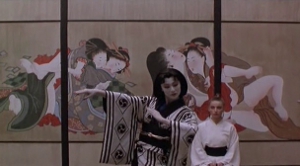
That this will eventually happen is never in doubt, and that’s a problem. The best action films, the best superhero films…hell, the best film-films work when they convince us the antagonist might actually pose a genuine threat to the protagonist. This is hard to do, especially if your protagonist is played by a bankable 80s Action star, gifted with 80s Action star nigh invulnerability. You can’t just beef up the Bad Guy’s (or Girl’s) army of anonymous thugs to compensate. Lord knows they aren’t going to be any use. No matter who they are, we all know going in that Dolph is going to wade through them, reach down their throats, and pull their fucking hearts out. Despite its one torture scene (where Lady Tanaka shows Frank her quite-well-laid-out rack) the movie never works at convincing me Our Anti-hero’s in any real danger…until the end.
Dressing him in boring biker attire only compounds the problem, and makes this Punisher even more of a Terminator knock-off than the act of casting Dolph Lundgren…or hiring Mark Goldblatt to direct, since Goldblatt edited The Terminator. And Commando. And Rambo: First Blood Part II.
Easy to see why they hired Goldblatt. As a director, he makes one hell of an editor, and I mean that in all sincerity. This is only his second film in the Big Chair, and while the action scenes are coherent, they aren’t too terribly exciting in a post Die Hard world. Goldblatt’s got no style. Or he never had the opportunity to develop one of his own since, after this, he’d return to editing full time, and go on to cut films like Nightbreed, Predator 2, Hollow Man, Pearl Harbor, Bad Boys II and Rise of the Planet of the Apes. And those are just the ones I’ve reviewed so far.
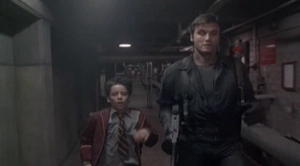
So while this film as a whole isn’t actively painful, its first two-thirds do come across as painfully generic, especially for that time. We’ve seen better vigilantes prowl through better urban hellscapes, and they’ve been played by better actors. This Punisher could’ve escaped its air of averageness, but it needed a few things. First, a different lead. Second, another pass through the script, focusing on the characters who actually wind up having something to do with the climax. Third, it also needed a U.S. theatrical release, though New World Pictures did manage to get it theatrical play in almost every other country on Earth before it popped up on America “New” Release shelves in 1991.
In order to end on a high note, I will say that climax is everything a Punisher movie should be: violent, gratuitous, over the top and (in the end) morally ambivalent. I wish that were true about the previous hour and five minutes. Lundgren fans and Action junkies probably already own this and don’t require my recommendation. Everyone else…meh, give it a shot if you want. Just be prepared for the movie to flee your mind like a vigilante sociopath fleeing the scene of his latest massacre before the police arrive.
![]()
![]()
![]()

From what I understand, The Punisher was more a rip off of Mac Bolan, the Executioner, than he was of Paul Kersey, though I’m sure the film’s success is what really got the guys at Marvel to want this character in their Universe. Here we have the decorated Vietnam vet who puts his skills to the test wiping out the Mafia, while, in the book, Kersey was just a liberal CPA who goes nuts after his wife and daughter are victimized and he goes out shooting muggers with a pistol, hoping to die. Kersey wasn’t a vet until the first film, which was released after the Punisher’s first appearance; on top of that, in the first film Kersey is hardly a death machine like the Punisher is…he’s still a dude with a gun, though the emphasis is less on his “death wish” and more on his “killing wish”. http://en.wikipedia.org/wiki/The_Executioner_%28book_series%29
Now, as to this movie, I’d say you mostly have its number. I don’t 100% agree you couldn’t do a Punisher movie outside of the mainstream Marvel Universe, but you’d have to make a damn fine film to avoid it being a run-of-the-mill 1980s style action movie. I still say I’d love to have seen the 1975 Punisher film from an alternate universe that was directed by Sam Peckinpah and starred Lee Marvin.
I’d see that, buy it, and set up regular house party screenings for all my flesh-space friends. That right there sounds like a perfect combo of director, star and subject. Frank Castle would’ve fit right into the Dirty Harry/French Connection period of U.S. action movies, before the proverbial mill’s proverbial output became so boringly predictable.
I wouldn’t mind Frank’s removal from his home universe so much if the parallel dimension New World chose to plop him down in were a bit more interesting. The lack of other, actual heroes, the absence of Frank’s battle van(s), and Microchip’s replacement with a drunk, homeless thespian who speaks in rhyme don’t amount to much in the long game. But the lack of supervillains really needled me all throughout. I couldn’t help but think, Yakuza-schmakuza: give me the original Jigsaw! Or Elite. Or Mr. Payback. Nicky Cavella, Bullseye, The Russian, The Holy…hell, they could’ve had John Rhys-Davies reprise his role as the Kingpin from Trial of the Incredible Hulk and tied all this together with the Marvel TV Universe of the late-70s. Then this movie would be a four out of five, no foolin’. Still wouldn’t come close to matching the sheer awesome of your alternate universe-Sam Peckinpah Punisher film, but it would’ve been a step in the right direction.
Whoever decided that Castle should have a comic relief homeless drunk actor sidekick…that guy deserved a kick in the pants. Ugh. Microchip, or even one of Castle’s standard “old war buddy whose gonna die soon” sidekicks would have been better. I agree on the villain, too, though I will say in the late 1980s the whole “Fear of a Japanese Planet” thing was at its peak and I feel like random Japanese stuff was almost a substitute for a super-villain. Almost. The problem here is they didn’t even pull out a Nin-Ja or some super high tech gadgetry; it would be easy to up the ante a little. John Rhys Davies in the place of Krabbe would have rocked.
Absolutely agree that the Yakuza stand in for supervillains, with Lady Tanaka’s daughter being the closest we come to any authentic Nin-Ja action. Which is too bad, since our director had plenty of Ninja experience. The fifth movie in Mark Goldblatt’s editing filmography? Enter the Ninja. Missed opportunity all around.
Say what you will about it, but it’s definitely the best Marvel film of the 80’s. It’s definitely not my favorite movie ever, but any flick with Dolph kicking ass is good with me:)
I have no problem with either of those statements.
No theatrical release in the U.S.? Well, I remember sitting in a ramshackle theater in a Boston, Massachusetts suburb and watching this flick when I was in high school. My primary recollection is a haze of confusion as I wondered if it was actually a Punisher film or just a labeling mistake.
It’s entirely possible some enterprising regional distributor pulled a print or three out of the wreckage of New World Pictures. Its collapse left a lot of movies in a weird state of ownership limbo. Some of us are still waiting for a Region 1 copy of Godzilla: 1985.
I think you should check out some of the original comics from the regular series made in 1987, they’re really well written and have more plot than violence in them. Mike Baron does a great job of creating interesting stories and characters, the only complaint is that there’s a lot of fucking text in it so it sometimes takes a while to get through it and sometimes I think they over expand on some of the details, but other than that they’re great. They were pretty realistic too. at the time a crapload of 80s Action Movies came out (which I love most of) and people figured that Punisher was just going to be a generic shoot, explosion Rambo fest, however that’s not how it turned out at all and I really would think you would enjoy and appreciate the story being told by these comics.
As for the movie, I’ve never seen it. My friend told me it sucked and he’s a big Punisher fan but I wanted to see what the critics said. I like that even though your a critic you don’t come across as an asshole as most critics do. Good review, I kind of skimmed through it though because I can’t ever read the full review for a movie unless I’ve seen the movie beforehand (because then I can think about points made and such and debate them in my head while also bringing back images from the movie).
Reason they didn’t do 70s Punisher movie was because he didn’t even have his own title then. He was just a character who popped up in other character’s comics and Marvel, if they didn’t think that he could support his own comic series at the time they definitely weren’t going to give him a movie.
I got into comics in general right at the tail end of the Mike Baron era, after the main series split into War Journal and War Zone. About two years into my comic book buying, Marvel consolidated all three Punisher books into one that eventually veered off into the general Crossover Frenzy that marked the Dark Age, along with the rambling text-boxes that over-explain everything. I’ll be sure to start as far back in Baron’s run as availability allows, on the strength of your recommendation. And thanks.